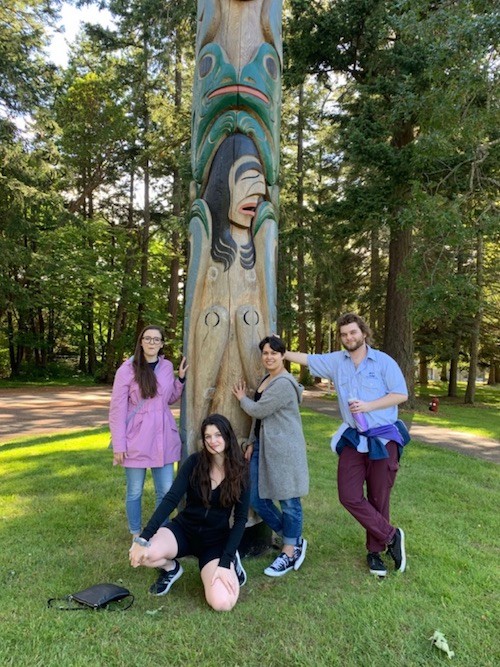
June 2019 marked the 7th year that the Centre for Digital Humanities (CDH) supported the week-long, intensive study of digital humanities theories, practices, and projects by providing tuition scholarships to attend the University of Victoria’s Digital Humanities Summer Institute (DHSI), of which the CDH is a supporting member. This year, two students graduating from the BA English programme and two students completing their MA in Literatures of Modernity received tuition scholarships. The four students shared a residence unit on campus. As Alex Pospisil observes, “Having gone on this trip with colleagues from the CDH who all took different courses, we were happy to share ideas in the evenings, spending time together discussing our classes, experiences, and issues in the digital humanities.”
John Connolly (BA) took a course in Linked Open Data and the Semantic Web. The course provided a context for the work he had done as a Yellow Nineties Research Assistant over the course of the academic year and helped him gain “an appreciation for the overarching goals of open data and the kinds of scholarship that this work facilitates.” Now at the University of Toronto studying artificial intelligence and its implications on employment in Canada, John “plan[s] to use the understanding [he] gained about linked data in my graduate studies in public policy.” Overall, John “was blown away at the outreach the digital humanities has. I had the pleasure of meeting people …from all over the world. I heard of ongoing projects that engage the world around in ways I have never considered. The residence we stayed in was a 10-minute walk from the ocean and the views were beautiful.”
Victoria Maxwell-Turanski (BA) took a course in Race, Social Justice and DH: Applied Theories and Methods. “Crucially, and quickly,” Victoria explains, “ I learned that the implications of critical race and social justice theories are necessary to consider in all aspects of project formation and production.” Tori begins law school at the University of Windsor this fall, where she will focus on social justice issues. She “feel[s] incredibly lucky to move forward in the world of academia and beyond with the understanding that I have developed with the help of many great scholars and people at this conference.”
Marion Grant (MA) took a course in Ethical Data Visualizations, she explains, “because of my interest in visualizing data, something that I had experimented a fair bit with in my research prior to the trip.” Mary particularly appreciated “how collaborative of an environment the conference is,” but also enjoyed “being able to travel with other student research fellows from TMU’s Centre for Digital Humanities. We had been working together all year on the Yellow Nineties 2.0 and so it was wonderful to be able to attend this conference together. My fellow CDH members attended my talk on my digital exhibit, Yellow Nineties Print and Performance, and it was so wonderful to have friendly faces in the audience.”
Alexandra Pospisil (MA) took a course in Intersectional Feminist Digital Humanities: Theoretical, Social, and Material Engagements. Alex appreciated “the opportunity to meet Digital Humanists from a variety of fields and levels of academia”—these included “archivists, librarians, PhD and Masters students.” Over the course of the week, Alex “learned about many different tools and approaches to digital projects, including a series of principles for Digital Humanities projects” and intersectional issues such as “erasure, accountability, and equitability.” She concludes: “the course helped me to generate many ideas for my own digital projects, especially in terms of ethics, narratives, and the potential for using census data and mapping. I learned a lot, and left with a sense of my mind brimming with potential.”
Applications to attend DHSI 2020 on a CDH-sponsored Tuition Scholarship will be invited in October.
